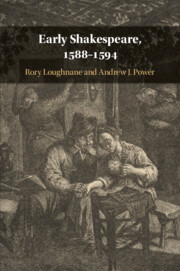Book contents
- Early Shakespeare, 1588–1594
- Early Shakespeare, 1588–1594
- Copyright page
- Contents
- Tables
- Notes on Contributors
- Acknowledgements
- Abbreviations
- Introduction Beginning with Shakespeare
- Chapter 1 Shakespeare and the Idea of Early Authorship
- Chapter 2 Collaboration and Shakespeare’s Early Career
- Chapter 3 The Language and Style of Early Shakespeare
- Chapter 4 Shakespeare’s Early Verse Style
- Chapter 5 Early Shakespeare, Chaucer, and Narrative Theory:
- Chapter 6 Poetry, Counsel, and Coercion in Shakespeare’s Early History Plays
- Chapter 7 John Lyly and Shakespeare’s Early Career
- Chapter 8 Spenser and Shakespeare: Bards of a Feather?
- Chapter 9 Arden of Faversham, Richard Burbage, and the Early Shakespeare Canon
- Chapter 10 Boy Parts in Early Shakespeare
- Chapter 11 The Origins of Richard Duke of York
- Chapter 12 Early Shakespeare and the Authorship of The Taming of the Shrew
- Chapter 13 Who Read What When?
- Book part
- Select Bibliography
- Index
Introduction - Beginning with Shakespeare
Published online by Cambridge University Press: 17 April 2020
- Early Shakespeare, 1588–1594
- Early Shakespeare, 1588–1594
- Copyright page
- Contents
- Tables
- Notes on Contributors
- Acknowledgements
- Abbreviations
- Introduction Beginning with Shakespeare
- Chapter 1 Shakespeare and the Idea of Early Authorship
- Chapter 2 Collaboration and Shakespeare’s Early Career
- Chapter 3 The Language and Style of Early Shakespeare
- Chapter 4 Shakespeare’s Early Verse Style
- Chapter 5 Early Shakespeare, Chaucer, and Narrative Theory:
- Chapter 6 Poetry, Counsel, and Coercion in Shakespeare’s Early History Plays
- Chapter 7 John Lyly and Shakespeare’s Early Career
- Chapter 8 Spenser and Shakespeare: Bards of a Feather?
- Chapter 9 Arden of Faversham, Richard Burbage, and the Early Shakespeare Canon
- Chapter 10 Boy Parts in Early Shakespeare
- Chapter 11 The Origins of Richard Duke of York
- Chapter 12 Early Shakespeare and the Authorship of The Taming of the Shrew
- Chapter 13 Who Read What When?
- Book part
- Select Bibliography
- Index
Summary
The Introduction first outlines the grounds for the collection’s dating parameters for ‘early Shakespeare’. It then discusses what a category such as ‘early’ or ‘late’ might mean for someone with Shakespeare’s long career, and how such temporally bound categories can condition critical responses. Next, it considers the many variables in play in Shakespeare’s early canon, discussing these with relation to the value ascribed to these works. The chapter then reflects upon how most readers of Shakespeare begin somewhere in the middle of the collected works, with super-canonical works like Twelfth Night and Hamlet, before, if ever, working to the margins of the canon where the early works reside. It concludes with brief summaries of each of the chapters in the collection, noting how contributors shed significant new light upon the formative part of Shakespeare’s career.
- Type
- Chapter
- Information
- Early Shakespeare, 1588–1594 , pp. 1 - 20Publisher: Cambridge University PressPrint publication year: 2020



